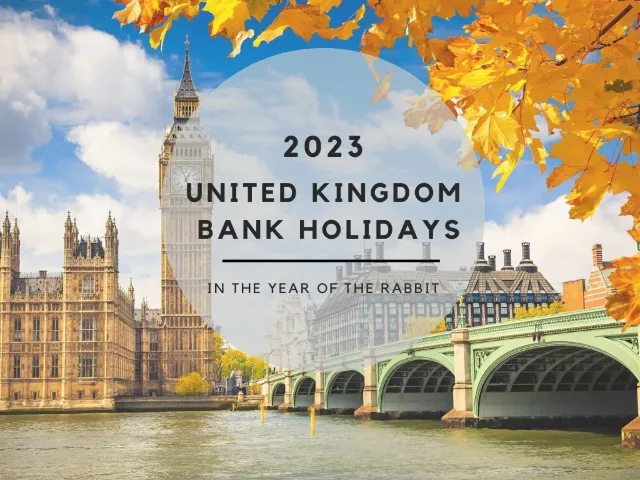United Kingdom bank holidays in the Year of the Rabbit 2023
Catalogue
- UK bank holidays in 2023
- New Year’s Day
- January 1 (Sunday)
- Saint Patrick’s Day
- March 17 (Friday)
- Good Friday
- April 7 (Friday)
- Easter Monday
- April 10 (Monday)
- May Day
- May 1 (Monday)
- Coronation of King Charles III
- May 6 (Saturday)
- Late May Back holiday
- May 29 (Monday)
- Battle of the Boyne
- July 12 (Wednesday)
- August Bank holiday
- August 7 (Monday)
- August Bank holiday
- August 28 (Monday)
- St Andrew’s Day
- November 30 (Thursday)
- Christmas Day
- December 25 (Monday)
- Boxing Day
- December 26 (Tuesday)
Show More

Looking forward to your holidays in 2023? It’s time to make travel plans and the key is to make full use of a public holiday to make a trip possible. Here we have rounded up the bank holidays in the United Kingdom and help you maximize your vacations.
Bank holidays are usually scattered across the calendar and refer to the national public holidays in the UK, which means many places in the country will be shut. On bank holidays, most shops and schools will close, and places of business will also generally shut down while public transport is reduced.
| Date | Day | Bank holiday | Regions |
| January 1 | Sunday | New Year's Day | National |
| March 17 | Friday | Saint Patrick's Day | Northern Ireland |
| April 7 | Friday | Good Friday | National |
| April 10 | Monday | Easter Monday | National except Scotland |
| May 1 | Monday | May Day | National |
| May 8 | Monday | Coronation of King Charles III | National |
| May 29 | Monday | Late May Bank Holiday | National |
| July 12 | Wednesday | Battle of the Boyne | Northern Ireland |
| August 7 | Monday | August Bank Holiday | Scotland |
| August 28 | Monday | August Bank Holiday | National except Scotland |
| November 30 | Thursday | St Andrew's Day | Scotland |
| December 25 | Monday | Christmas Day | National |
| December 26 | Tuesday | Boxing Day | National |
New Year’s Day is January 1 and the first day of the calendar year. The day is marked by a public holiday in the UK. Like many other countries in the world, New Year’s Eve is widely celebrated by laughs and groups of families and friends. It’s worth mentioning that at midnight people in the UK usually sing the song ‘Auld Lang Syne’ to usher in the New Year.
Every year in London, hundreds of people line at the Thames to watch colorful fireworks, light displays to ring in the New Year.
Saint Patrick’s Day, also known as the Feast of Saint Patrick, is a cultural and religious celebration that annually falls on March 17 in Northern Ireland. A symbol of Saint Patrick’s Day is the shamrock, a type of three-leafed clover.
The Irish have observed this day as a religious holiday for more than 1000 years. Traditionally, Irish families would attend church in the morning and celebrate in the afternoon. Some traditional foods eaten on this day include soda bread, cabbage and corned beef.
Good Friday, the Friday before Easter, is considered the most significant holy day by Christians. It’s a bank holiday to commemorate crucifixion of Jesus Christ and his death at Calvary. Many members of Catholic, Eastern Orthodox and Lutheran faiths will attend church services. But there is much more to this holiday than just these religious rituals. For many, Good Friday is an intensely personal day of prayer and devotion.
It is also a tradition to eat hot sweet cross buns on Good Friday, and it supposedly brings good luck.
Easter Monday refers to the day after Easter Sunday in either the Eastern or Western Christian traditions. It is observed as a public holiday in some countries across the globe and is part of the Easter period.
Easter, one of the oldest Christian traditions, is the celebration of the last week of Jesus’ life, his death, and his resurrection. The Easter weekend is the first public holiday period of the year to enjoy spring-like weather, while so many outdoor events are generally part of Easter celebrations.
Officially known as the Early May Bank Holiday, May Day is usually held on the first Monday in May each year. May Day has been an official public holiday all over the UK since 1978 when provisions were made for it in the Banking and Financial Dealings Act. Prior to that time, it was a holiday only celebrated in Scotland.
Over the centuries, May Day has been associated with fun, revelry and fertility. The day would be marked with village folk cavorting round the maypole, the selection of the May Queen and the dancing figure of the Jack-in-the-Green at the head of the procession.
Coronation of King Charles III is set to take place on May 6, 2023 at Westminster Abbey. It’s expected that the King will sign a proclamation formally declaring the date of the coronation at a meeting of the Privy Council this year.
According to Downing Street, the holiday will fall on May 8 following the coronation. And the holiday will take place across the UK.
Also known as the Spring Bank Holiday, the Late May Bank holiday is a time for people in the UK to have a day off work or schools. It’s held annually at the end of May to create a long weekend.
In general, people on this day will take a trip with families or friends to relax. In addition, many people take long walks through the spring countryside, stock up at garden centers, or do home improvement jobs.
The Battle of the Boyne holiday is commonly known as Orangemen’s Day and the Twelfth. It’s a commemoration of the Glorious Revolution in 1688 and the culmination of that revolution in the Battle of the Boyne in 1690. It’s one of the more contentious dates in the UK calendar and is an UIster Protestant festival on this day.
The Battle of the Boyne took place in 1690 between King James II, a Catholic, and King William III, a Protestant, who had deposed James as King of England in 1688. The battle took place at Old Bridge, across the River Boyne, and William was victorious.
August Bank Holiday in Scotland falls on the first Monday in August while it is recognized on last Monday in August in England, Wales, and Northern Ireland.
The August Bank Holiday falls on the last Monday of August across the UK, except in Scotland where it’s held on the first Monday of the month.
Unlike the Spring bank holidays, the August holiday does not represent a modern version of any older religious festival. It’s more likely the date holiday in August was selected to provide workers with a break before the conclusion of summer and before the long period of work without a holiday between then and Christmas. Many people in the UK will visit local beaches, parks, and tourist destinations on this day.
St Andrew's Day is the feast day of Andrew the Apostle, and is celebrated annually in Scotland on November 30. It’s also considered Scotland’s National Day.
People will be able to enjoy a varied program of events and festivals, featuring uniquely Scottish line-ups of music, dance, culture and more.
Like many other English-speaking countries across the globe, UK celebrated Christmas Day on December 25. Christmas Day is one of the most important public holidays throughout the country.
The UK still has a significant portion of the population that keeps Christmas in a very religious spirit. But to a large degree, the holiday has become rather secularized and commercialized.
It is a time to have family togetherness during off-work days, while some families will choose this holiday to make a trip domestically and globally.
Boxing Day occurs on the day after Christmas each year, and falls on December 26. In the UK, Boxing Day became a holiday during the reign of Queen Victoria, its earliest mention in writing dating from the 1830’s.
Today, the Boxing Day has become a time of major sports events, much as Thanksgiving Day is in the United States. It’s only celebrated in a few countries such as Canada, Australia, South Africa and New Zealand.
Trending Travelogues
Popular Travel Types
Popular Attractions
Popular Ranked Lists
Popular Destinations
Recommended Attractions at Popular Destinations









Site Operator: Trip.com Travel Singapore Pte. Ltd.




